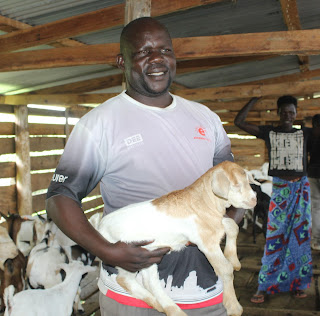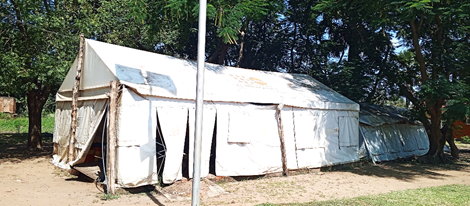Story of Lyato United Goat Farming Sub-Project – Hoima District
In Hoima District, Baseruka S/C in the Nyakabingo Parish are three groups that benefited from the LSP (Livelihood Support Programme) of DRDIP. The beneficiaries were selected through a community PRA (participatory rural appraisal) process led by community facilitators. They were organized into CIG (Community Investment Groups) and trained on the five core principles of DRDIP; weekly savings, regular meetings, loaning and loan repayment as well as record keeping. As well as business and financial management, co-responsibilities, etc. After which they were awarded certificates of completion, established their group constitutions, and opened bank accounts. The community facilitators also continued holding sensitization meetings with the groups.
Lyato United Goat farmers group at first selected motorized fishing boats as their preferred project but had to reconsider their preference as the group is located far from the lake shores. So they instead chose goat rearing. The group subsequently received 18.9 million in their bank account to start their sub-project in April 2019. They started with the construction of the structure to house the goats and bought the record-keeping materials that they needed. The District Veterinary Officer (DVO) gave the group guidance on the proper construction of the goat shelter which cost 10 million. The rest of the fund was used to buy 45 goats, drugs, masks, and sanitizers.
The group chairman Mr. Wilberforce, reported that the group had made good progress with their sub-project. The number of goats which are a mix of local and exotic breeds had grown in total to 204 from the original 45 but with 91 goats now remaining. 11 had died, 10 had been stolen, 48 had aborted or lost their kids, 10 were sold for medicinal drugs and 32 had been shared amongst the 15 group members. The chairman testified that they had received many visitors coming to their village to visit and learn from their sub-project. Some of the good results he said were that the group had acquired valuable training. They had learned how to start and manage the business, save, and most importantly, they had come together as a community because of the DRDIP’s participatory and group approach.
According to Mr. Wilberforce: “In the near future, we should have more than 200 goats. Once we have a big number of books then we will think about the next phase and direct income to the group. We have never seen a project like DRDIP that has brought all the different tribes and diverse peoples in the area together; the Banyankole, the Lugbara, the Banyoro, the Bafumbira, the Alur who dominate in the area, and many refugees who have all come together because of DRDIP. We hope we can be graduated to a self-help group where we can be eligible to access Village Revolving Funds of up to 55 million under DRDIP so we can develop further and grow. Our greatest development needs are for an improved water source and for a better road to the village.”





Comments
Post a Comment